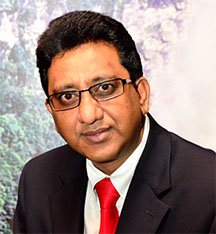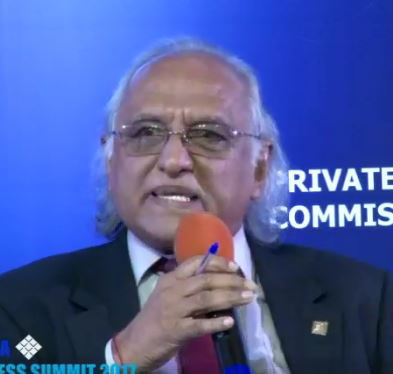Acting Chief Justice Roxane George-Wiltshire yesterday denied attorney Christopher Ram an order he was hoping to secure to stop the Guyana Elections Commission (GECOM) from continuing the ongoing national house-to-house registration exercise, while saying that she needed evidence that the exercise would go beyond September 18th, the three-month timeline by which elections are to be held.
Speaking to the media following the in-chamber hearing yesterday morning, Ram’s attorney, Anil Nandlall, said that his legal team will be providing the evidence requested by the court in further submissions to be filed.
According to Nandlall, while the conservatory order his client sought was denied, of significance was the fact that the judge emphasised “that she understands that the CCJ (Caribbean Court of Justice) ruled that the elections must be held by September the 18th.”

According to Nandlall, this was clearly said by the Chief Justice, who noted that this was the ruling of the CCJ in accordance with Article 106 (6) and (7) of the Constitution that elections must be held by September 18th, 2019.
In its ruling of June 18th, the Trinidad-based CCJ—Guyana’s final appellate court ruled that the passage of a no-confidence motion against the APNU+AFC government on December 21st, 2018 was valid and that the clear provisions of Article 106 immediately became engaged.
Article 106 (6) says Cabinet, including the President, shall resign if the government is defeated by the vote of a majority of all the elected members of the National Assembly on a vote of confidence. Article 106 (7) adds, “Not-withstanding its defeat, the Government shall remain in office and shall hold an election within three months, or such longer period as the National Assembly shall by resolution supported by not less than two-thirds of the votes of all the elected members of the National Assembly determine, and shall resign after the President takes the oath of office following the elections.”
No way
Nandlall said the Chief Justice explained that they have not satisfied her that there is sufficient evidence to substantiate that GECOM is not acting to complete the registration process and hold elections within the September 18th timeframe.
Noting the court’s request for more evidence, Nandlall said his legal team is committed to providing such in an affidavit which they needed to have filed by the end of yesterday.
Nandlall said that their affidavit will demonstrate through the evidence that they have to support their contention that the house-to-house registration exercise will go way beyond September 18th.
He declared, “The whole country knows that it will go beyond because they [GECOM] are constructing a new list.”
Nandlall expressed the view that there “is no way such an exercise can be completed within, and for the holding of an election by September 18th.”
On this point he said it must be remembered that the list has to first be compiled, then time given for claims and objections to the list itself. It then has to be extracted from the national register to the voters’ list, while staff would still have to be trained for elections.
“By what process of logic can that ever be concluded by September 18th?” Nandlall questioned, while adding that the GECOM cannot scrap the existing register since some people will be deregistered and disqualified from voting by what he called “some administrative decision.”
Asked whether persons cannot be placed back on the list by claims and objections, Nandlall asked, “Suppose the person is not here (in Guyana)?”
Pressed by the media as to whether the concerns he raised did not exist during previous house-to-house registration exercises while he served under the former People’s Progressive Party/Civic (PPP/C) government, Nandlall said, “I wasn’t part of that.”
Reemphasising his client’s position that the registration exercise is illegal, and contemptuous of the CCJ ruling and violates the constitution, counsel said that these are grounds on which he also has to address the court.
The matter comes up for arguments on August 7th.
Asked if he would get registered in the current registration process, Nandlall said he would not, as neither he nor the PPP/C can lend themselves to what he called an “illegal exercise.” As he had indicated since last week, Ram, too, said that he will not be registering.
Withdrawn
Long before Ram’s challenge, overseas-based Guyanese Bibi Zeenatoun in late May had initiated legal action to prevent what was then the planned national house-to-house registration exercise.
Following the CCJ’s ruling, however, Nandlall, who also represented Zeenatoun, said yesterday that he withdrew the case, a move he said he now regrets.
According to the lawyer, with the CCJ having ultimately ruled in the manner it did, he thought that GECOM would have complied as it said it would and so it was on the basis of that, that he withdrew the application filed by Zeenatoun.
He said he thought the Commission would have complied with the “clear directions of the CCJ.”
Ram, an attorney, chartered accountant and political commentator, is of the view that the house-to-house registration exercise is being undertaken in violation of the Constitution.
In his fixed date application, which was filed on Monday, Ram’s attorneys asked the court to declare that the registration exercise is in violation of the letter and spirit of the Constitution and the judgment and consequential orders made by CCJ in the consolidated cases stemming from the passage of a no-confidence motion against government last December.
The application argues that since passage of the motion against the David Granger-led administration, neither the Cabinet nor President has resigned; nor has the Head of State issued a proclamation dissolving the National Assembly or fix a date for elections to be held within the three months as is stipulated by Article 106 of the Constitution.
While it has been government’s position that the exercise is an important prerequisite to the holding of credible elections, both Ram and the opposition PPP/C say it would be in contravention of the Constitution.
GECOM has said that while it is undertaking the registration exercise, concurrent operational activities for the preparation of general and regional elections are also underway.
In her fixed date application Zeenatoun, a pensioner, had asked that the High Court to declare the registration exercise “unconstitutional” and grant orders restraining GECOM and its staff from conducting the exercise, not only in June but at “any date thereafter,” as she contends it would disenfranchise her.
Zeenatoun, who “voted in elections in Guyana as recent as the 2018 Local Government Elections,” feared that she would be excluded from the exercise and, thereby, in effect, will be de-registered and “unlawfully denied her statutory and constitutional right to be registered and to vote,” as she will be out of the country for five months beginning in May.
She had asked the court to validate this fear by granting a declaration that house-to-house registration would exclude her and other qualified registrants currently on the National Register of Registrants and on the Official List of Electors, in contravention of their constitutional right to vote.





